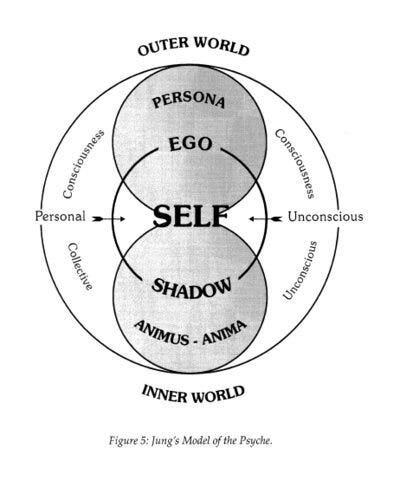Healing Through Shadow Work: Transforming Trauma from Narcissistic Relationships
Written on
Chapter 1: Understanding Shadow Work
Shadow work involves confronting the aspects of ourselves that we typically reject or hide. As Carl Jung articulated, the "shadow" represents the unseen elements of our psyche. It's termed the shadow because it exists outside the reach of our conscious awareness. The key to healing isn't to evade these darker aspects but rather to embrace them fully. Often, we hesitate to engage in this work, fearing shame or embarrassment as we illuminate the hidden parts of ourselves.
Psychology writer Conni Biesalski explains that "shadow work is also trauma work; it helps us heal the wounded parts within us. Many shadows stem from developmental or attachment trauma experienced in childhood, moments when we lacked the resources to fully process our emotions, leaving scars that linger in our nervous system and the narratives we create."
According to Jungian coach Imi Lo, "Essentially, shadow work is a profound process of self-integration. Our shadows are the facets of ourselves we've disowned or suppressed due to past traumas or societal expectations. Jung described the shadow as the unknown, darker side of our personalities."
The primary advantage of engaging in shadow work, particularly after experiences of narcissistic trauma, is the realization that you can surround yourself with loving and supportive individuals. Often, people find themselves drawn to those who mistreat them due to unresolved shadows. This tendency is prevalent when entangled with individuals exhibiting Cluster B personality disorders, and recovery aims to break this cycle.
The 12 Jungian Archetypes
Sage, Innocent, Explorer, Ruler, Creator, Caregiver, Magician, Hero, Rebel, Lover, Jester, & Orphan.
We all embody these archetypes, and by increasing our awareness of them, we enhance our self-discovery. Shadow work primarily involves self-reflective exercises.
20 Questions to Initiate Your Shadow Work Journey
- What are your top priorities in life, and what legacy do you wish to leave?
- Do you consistently practice self-care and manage your emotions healthily?
- Is there someone you can't stop obsessing over? What prevents you from moving on?
- Do you feel misunderstood? What misconceptions do others have about you?
- Do you experience anxiety or panic attacks? What triggers them?
- What is the most regrettable action you've taken, and do you feel guilt about it?
- Did you have a traumatic childhood? Are there patterns from that time that reappear?
- What are your parents' most admirable and least admirable traits? Do you see them in yourself?
- How do you enforce boundaries? Do you allow others to overstep them?
- Do you forgive yourself for past mistakes, or do they continue to affect you?
- What are your toxic traits, and do you see similar traits in your family?
- Are you comfortable being alone, or do you rely on others to fill emotional voids?
- How do you respond to constructive criticism? Are you overly sensitive to feedback?
- Are you open in your romantic relationships, or do you build emotional walls?
- Do you accept yourself as you are?
- What is your deepest fear?
- Do you feel respected by others? Does their lack of respect bother you?
- What is your biggest regret, and why?
- What is your attachment style, and how has it impacted your life?
- Do you regularly engage in self-care and emotional management?

Steps to Practice Shadow Work in Recovery from Narcissistic Abuse
- Decide whether to pursue therapy or shadow work and commit to it.
- Identify your inner shadow without judgment.
- Reflect on your childhood experiences.
- Meditate to recognize your emotional triggers.
- Maintain a shadow journal to capture your reflections.
- Express your shadow through creative outlets such as art, music, dance, or writing.
- Avoid projecting your inner struggles onto others.
Self-Care Practices for Healing from Narcissistic Abuse
- Monitor your stress levels.
- Ensure adequate sleep.
- Connect with a higher power.
- Maintain a healthy diet and hydrate well.
- Engage in enjoyable activities.
- Surround yourself with positive influences.
- Find your community of like-minded individuals.
- Incorporate physical activity into your routine.
- Utilize coping skills learned in therapy for managing relationships.
- Practice self-compassion and patience as you heal.
- Forgive yourself for past relationships with narcissists.
Shadow work is a vital journey for anyone seeking to understand themselves better, recognize repetitive relationship patterns, and achieve complete trauma healing. However, it's essential to approach this work cautiously and seek support from a qualified Jungian analyst.
The path to wholeness and freedom after enduring a relationship with a pathological narcissist can be intricate and time-consuming. It often requires a variety of healing methods, including different support systems and therapeutic approaches. This journey demands determination, persistence, faith, and focus to enable personal growth and transformation.
Stay committed to your healing journey. A fulfilling and joyful life is possible beyond the trauma. Embrace the beauty and wonder that life offers, even after experiencing hardship.

Pesqueda 2024
If you've been impacted by someone with narcissistic personality disorder, visit my website for a wealth of resources, and consider subscribing to my educational articles on Medium.
Let’s keep moving forward together! Spread the knowledge!
Email: [email protected]
Listen to my podcasts on major platforms (most are free):
Want even more resources? Check me out on these platforms!
Instagram: pesqueda_narc_survivor
I am a facilitator for recovery from narcissistic abuse, currently accepting clients at a reduced rate compared to traditional therapy, which often falls short in addressing these specific needs.
Narcissism
Psychology
Relationships
Abuse
Trauma
In the video Is Shadow Work the Secret to Healing Childhood Trauma?, we delve into how shadow work can illuminate past traumas and aid in emotional recovery, offering practical insights for those on their healing journey.
The video Healing Trauma from Relationships with Narcissists and Borderlines discusses strategies for overcoming the emotional scars left by toxic relationships, emphasizing the importance of self-awareness and healing.